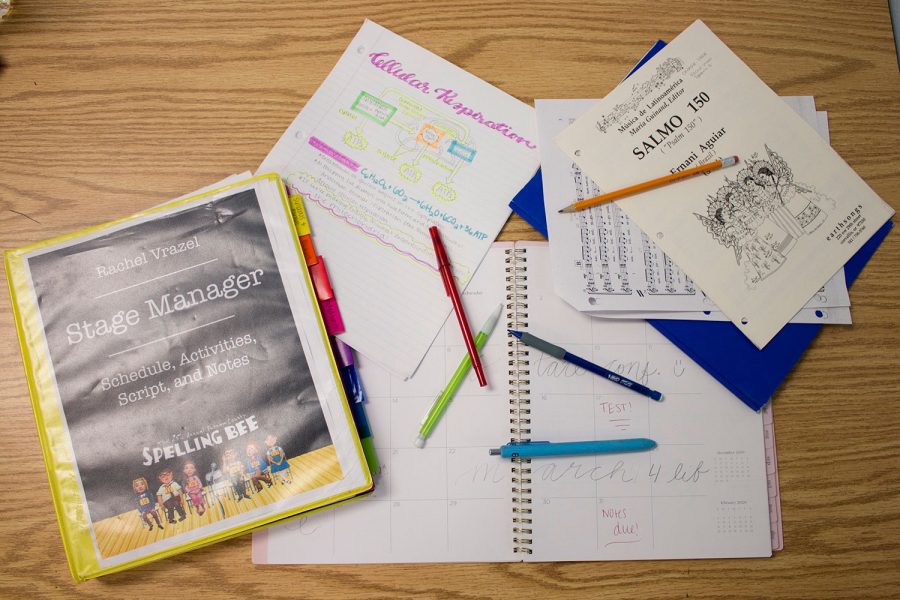The Burden of Success
Perfectionism and overachieving combined with anxiety causes undue stress and suffering.
A Plethora of Responsibilities: Taking part in many extracurriculars and multiple advanced classes can be enjoyable for many students. However, being so involved can also cause a lot of stress and anxiety, specifically for students who are determined to perform perfectly in all aspects of their involvement.
It’s not difficult for people to pinpoint me as an overachiever. If you’ve never met me and you asked me something along the lines of, “what do you do in your spare time,” or “what are your hobbies,” or “what is something you’re passionate about,” you’re going to get a lot of information. You will indeed hear a detailed explanation of my involvement in my youth group, theatre, choir, newspaper, principal’s council, student leadership – the list goes on and on. And upon examining my involvement in these activities, you also won’t be hard – pressed to see that I’m also a perfectionist.
I spend hours perfecting most of my school projects, pouring much more time and energy into it than most others would. This bleeds into my organization – if you find a color-coded binder or happen to stumble upon a personal bookshelf organized by reading level, genre, and the alphabet, chances are they belong to me. And, I would be lying if I didn’t say that being an overachiever and a perfectionist didn’t bleed over into how I want others to see me. I am always doing my best to be someone that people find likeable, a friend that everyone loves, the person who helps out the most or had the biggest impact, the “grown-up” that little kids look up to and aspire to be. The problem is that a lot of the time, it works.
This is because people often perceive people who are overachievers, perfectionists and even people pleasers, as people who have their life together. When they see someone with a long list of accomplishments, someone who is always organized or wears nice outfits to school, someone who is always polite and seems to always know the right thing to say, they often assume that things are just going really well for them and their life must be all bright and shiny. Over the years, many people have off-handedly mentioned that they wish they had those things because that’s what they see in me. While it is a great compliment that people think so highly of me, and I certainly am thankful for all I have achieved, the excellence I’ve gained in academics and extracurriculars, and how outspoken I am, what people don’t realize is there is so much more going on beyond the surface.
Perfectionism and overachieving can be very beneficial, but they truly come with their own challenges – needing to measure up to the impossibly high standards you set for yourself, feeling inadequate and unworthy, and working yourself sick over everything you are juggling and everything you are trying to be. This in and of itself is a huge struggle for a lot of people. But for a lot of people, like myself, there is also so much more behind these personality traits than most realize.
Anxiety has been something that has followed me around all of my life and has infected almost every corner of my existence. Perfectionism and overachieving are no different. All of the pressure and expectations I feel are heightened, and the frustration and disappointment you would feel after you didn’t get that big opportunity you were going for or you got a bad grade on a test automatically warps into panic and self- inflicted shame. The worst part is, it develops into a cycle – put to much on your plate, try to be the best at everything you’ve decided to juggle, “fail” according to your expectations, feel absolutely terrible about yourself, and then add more to your plate to make up for the ways you’ve failed in other areas so you can be incredible at them and prove yourself – which starts the cycle all over again.
But what really makes everything so difficult is that when you have anxiety on top of overachieving and perfectionism, it’s not just that you have a hard time stepping away from opportunities or commitments when you have too much going on – it’s that you’re too ashamed to reach out for help. It would be difficult for the normal perfectionist to admit that they were struggling. But with fear on top of it, you don’t want anyone to know because you are so afraid of disappointing others, that they’ll be as angry and frustrated with yourself as you are. So, you just continue to struggle, trapped in the prison of your own consciousness with all of your overwhelming responsibilities haunting you as cellmates.
It certainly doesn’t help that you’re already under so much criticism. This is a common theme in classroom activities. Group projects are basically hell because nobody can understand my need to be successful isn’t just a type – A personality quirk and they are so quick to judge my working style. When people don’t do their work well enough to get a good grade or I get aggravated when they waste our class time, all they can see is someone who is stuck up and bossy. They don’t see the me who is so worried that this one grade will bring my grade down, bringing my GPA down, meaning that I can’t get into a good college and then I’ll disappoint everyone I love. And yes, I know this is unrealistic, but anxiety is unrealistic, and not me – or millions of others who suffer from the same illness – can’t always control this toxic thought process.
What I’ve noticed is that what anxious, perfectionist, overachieving students need isn’t actually validation or praise – even though it’s what they strive for. What they need isn’t even extra help in all of the areas where they are drowning in the work and responsibilities they’ve plagued themselves with. What they need is for people to understand where they are coming from, and to be understanding in the moments where they might annoyingly take charge. They need friends who will kindly remind them it’s okay to fail; they don’t have to be the best at everything, and that their worth isn’t determined by their accomplishments or accolades. They need friends to tell them that their hobbies can just be hobbies and that their fun classes can just be fun. Friends to kindly and lovingly remind them that even though it feels amazing to hear their name called at an awards banquet, even though it feels great to see their name in the top ten of their class during assemblies, even though it’s incredible to have others look up to your talent and skill, sometimes the sweetest victory of all is simply being free from the burden of success.
Your donation will support the student journalists of Francis Howell Central High School. Your contribution will allow us to purchase equipment and cover our annual website hosting costs. FHCToday.com and our subsequent publications are dedicated to the students by the students. We hope you consider donating to allow us to continue our mission of a connected and well-informed student body.








